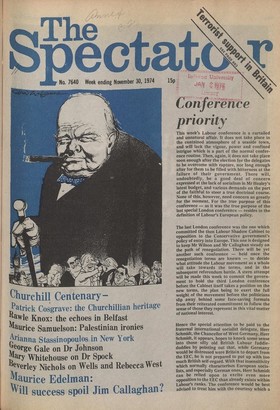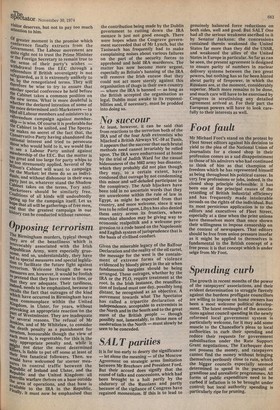Conference priority
This week's Labour conference is a curtailed and unnatural affair. It does not take place in the contained atmosphere of a seaside town, and will lack the vigour, power and confined intrigue which is a part of the normal conference routine. Then, again, it does not take place soon enough after the election for the delegates to be overcome with rapture, nor long enough after for them to be filled with bitterness at the failure of their government. There will, undoubtedly, be a good deal of concern expressed at the lack of socialism in Mr Healey's latest budget, and various demands on the part of the faithful to steer a true doctrinal course. None of this, however, need concern us greatly for the moment. For the true purpose of this conference — as it was the true purpose of the last special London conference — resides in the definition of Labour's European policy.
The last London conference was the one which committed the then Labour Shadow Cabinet to opposition to the Conservative government's policy of entry into Europe. This one is designed to keep Mr Wilson and Mr Callaghan steady on the path of renegotiation. There will be yet another such conference — held once the renegotiation terms are known — to decide what attitude the Labour movement as a whole will take towards the terms, and in the subsequent referendum battle. A stern attempt will be made this week to commit the government to hold the third London conference before the Cabinet itself takes a position on the new terms, the plan being to exert the full weight of the movement before the politicians slip away behind some face-saving formula from their reiterated commitment to follow the sense of those they represent in this vital matter of national interest.
Hence the special attention to be paid to the fraternal international socialist delegate, Herr Schmidt, the Chancellor of West Germany. Herr Schmidt, it appears, hopes to knock some sense into those silly old British Labour fuddleduddies by pointing out that, while Germany would be distressed were Britain to depart from the EEC, he is not prepared to put up with too much British self-regard. With that insensitivity which normally characterises European socialists, and especially German ones, Herr Schmidt can be relied upon to excite even more opposition to the EEC than already exists within Labour's ranks. The conference would be best advised to treat him with the courtesy which a Visitor deserves, but not to pay too much attention to him.
Of greater moment is the promise which conference finally extracts from the Government. The Labour movement are quite right not to trust the Prime Minister or the Foreign Secretary to remain true to the sense of their party's wishes — withdrawal from the EEC through a referendum if British sovereignty is not safeguarded, as it is extremely unlikely to be, by the renegotiated terms. They will therefore be wise to try to ensure that another special conference be held before the Cabinet takes a common position on the new terms. What is more doubtful is Whether the declared intention of some of the more determined anti-Marketeers — to oind all Labour members and ministers to a referendum campaign against membership — is wise. Of course it is preferable for the Cabinet to be united, and The Spectator makes no secret of the fact that, the Conservative Party having abandoned the national interest and tried to persecute ,those who would hold to it, we would like t° see a Labour Party united against membership of the EEC. But the matter is 100 great and too large for party whips to too strenuously applied. Several of Mr r'fison's Cabinet will want to campaign 'br the Market: let them do so as indivi(ilia's, and without dishonour in their own Party just as, whatever stand the Shadow Cabinet takes on the terms, Tory antiMarketeers should be similarly free. Coa.litions of all kinds will undoubtedly sbPrIng up for the campaign itself. Let us "oPe that all will be gatherings of free men, that the greatest campaign in our ist y can be conducted without rancour. .3!:Ir several reasons. The refusal of Mr The Birmingham murders, typical though st '3,111e, and so, understandably, they have ,e.0 to special measures and special legislation to facilitate the future fight against terrorism. Welcome though the new Indeed, needs to be emphasised, because it recalls the fact that outrages of the kind 1143'llich have occurred in Birmingham have Part of Westminster. They are inadequate frnkins, and of Mr Whitelaw, to consider each man is, is regrettable, for this is the ,h,11.'Y appropriate penalty and, while it irre Int easures are, however, it would be foolish ,o Pretend that they have come in time, or that they are adequate. Their tardiness, Provoking an appropriate reaction on the they are of the beastliness which is "Publican Army, were especially grueR `erorism, honourable though the view of e.en commonplace within the United ingdom, in Ulster, for years, without e death penalty as a punishment for ',posing terrorism vocably associated with the Irish
• •
not deter the most determined ttillers, is liable to put off some at least of h „,"mr less fanatical followers. Then, we tires have welcomed far sterner mea'res to control traffic between the Public of Ireland and Ulster, and the "ePublic and the United Kingdom: all fitlierrilla warfare thrives on a base outside e.area of operations, and that base is ;11.allable to the IRA in the Republic. InallY, it must now be emphasised that the contribution being made by the Dublin government to cutting down the IRA menace is just not good enough. There were hopes when the Cosgrave government succeeded that of Mr Lynch, but the Taoiseach has frequently had to make complaining noises about various failures on the part of the security forces to apprehend and hold IRA murderers. The matter has now become more urgent, especially as Britain's banning of the IRA will remove the Irish excuse that they could not act more sternly against this organisation of thugs in their own country — where the IRA is banned — as long as the British accepted the organisation as legal. Dublin must awake to its responsibilities and, if necessary, must be prodded into doing so.











































 Previous page
Previous page